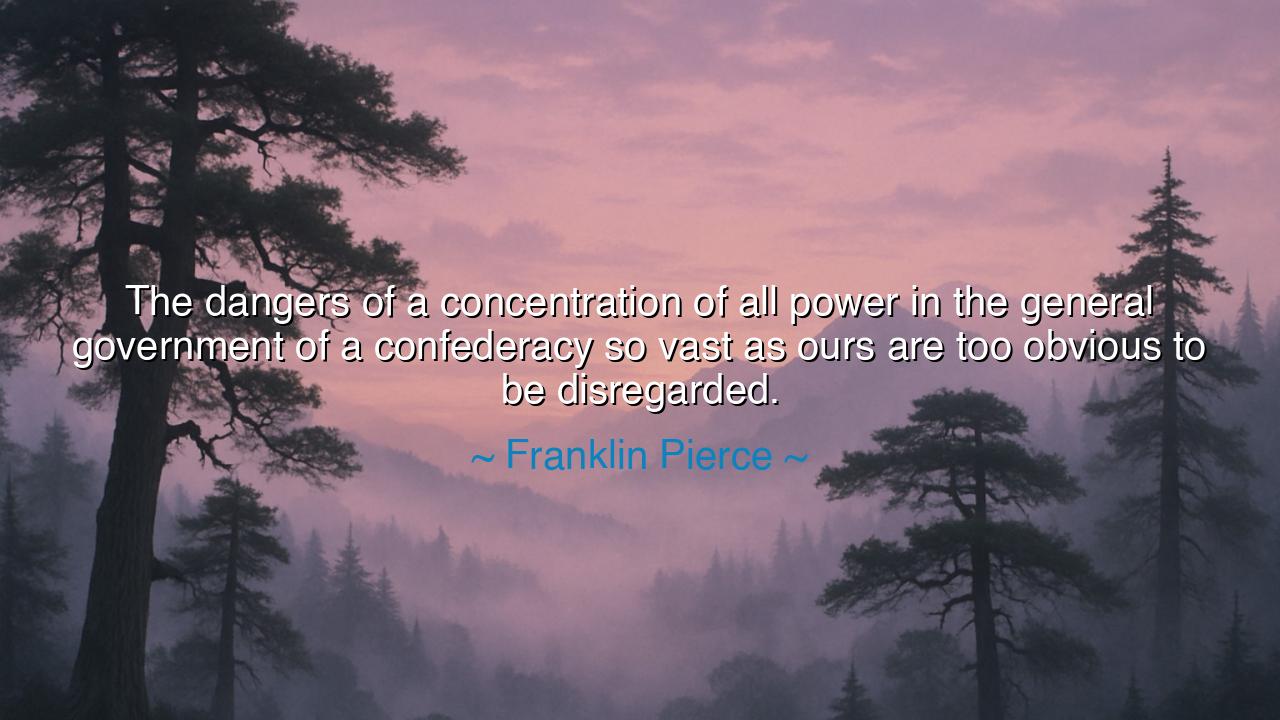
The dangers of a concentration of all power in the general
The dangers of a concentration of all power in the general government of a confederacy so vast as ours are too obvious to be disregarded.






"The dangers of a concentration of all power in the general government of a confederacy so vast as ours are too obvious to be disregarded." — Franklin Pierce
Hear these words, O heirs of liberty, and ponder their meaning, for they carry the weight of centuries. Franklin Pierce, the fourteenth President of the United States, spoke them in a time when the young republic trembled under the strain of division — North against South, liberty against law, unity against pride. His warning was not born of ambition, but of caution: that in a nation so vast, bound by many states and many minds, the concentration of all power in a single central government would one day endanger the very freedom it was meant to preserve. His words are a sentinel’s cry — a call to remember that liberty thrives best when power is shared, not hoarded.
Pierce spoke from the shadow of history, for the founders themselves had feared the same. When the Constitution was born, it was forged in delicate balance — between the general government, which could unite and protect, and the individual states, which could preserve the liberties of their citizens. The fathers of the republic had tasted the bitterness of tyranny and knew that power, like fire, must be carefully contained. Too little, and the house grows cold; too much, and the house is consumed. Thus, they divided authority among many hands, so that none might rule unrestrained. Yet Pierce saw, even in his own day, that this balance was shifting — that the flame of federal power was growing too fierce, threatening to scorch the freedom it was meant to warm.
The meaning of his warning reaches beyond his century. To concentrate all power in one seat, one government, one class, or one will, is to place all trust in human virtue — a frail foundation at best. History’s great empires have fallen not only from conquest, but from within, when the hands of the few began to tighten around the lives of the many. When Rome surrendered its republic to emperors, when France bowed to the reign of kings, when nations of promise traded liberty for order, they learned too late that power once centralized is seldom returned. Pierce, gazing upon the swelling might of the federal government, foresaw that same danger in America’s vast and restless expanse.
Consider, then, the story of the Roman Republic, whose people once prided themselves on their freedom and virtue. Over time, their Senate became corrupt, their citizens divided by wealth and faction, and in their weariness they placed all power into the hands of one — Julius Caesar. They called it salvation, yet it became submission. The republic died not by sword but by consent. The same peril, Pierce warned, could befall his own nation if its people forgot to guard the boundary between governance and domination. For even the most benevolent government, unchecked, becomes the master of those it once served.
Pierce’s age was one of growing central authority — railways, commerce, and industry knitting the vast continent together, yet also binding it under the reach of federal control. He feared that as the nation expanded, its people might trade their independence for the illusion of unity. A confederacy so vast as ours, he said, could not endure if all decisions were made from afar, without the living voice of local will. Freedom dies not in open conquest, but in the slow erosion of autonomy — when citizens, weary of responsibility, yield their power to distant hands. Thus, Pierce’s warning was both political and moral: liberty requires participation; it cannot survive on obedience alone.
His wisdom rings true even in our modern age. The instruments of control may change — no longer thrones or crowns, but bureaucracies and systems — yet the danger remains. Whenever one power grows too mighty, whether in government, corporation, or creed, the people must remember that they are the guardians, not the subjects, of their own destiny. Power must be divided, questioned, and held accountable, lest it forget its purpose. A free nation does not fear disagreement; it fears submission.
So, my children of democracy, let Pierce’s words be written not merely in books but in your hearts. Do not surrender your will to the comfort of central command. Question authority, cherish local voice, and guard the balance that keeps liberty alive. Remember always: a government strong enough to give all things is also strong enough to take all things. Freedom endures not through power’s growth, but through power’s restraint. For when the people are vigilant, their nation stands; but when they turn away, their chains are forged in silence. And thus, the dangers of concentrated power — so obvious to the wise — must never again be disregarded.






AAdministratorAdministrator
Welcome, honored guests. Please leave a comment, we will respond soon